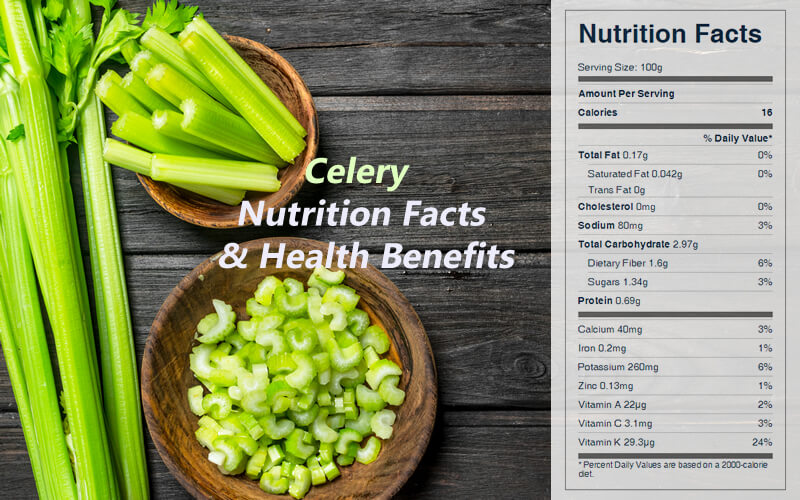Celery Nutrition Facts & Health Benefits
Celery is eaten around the world as a vegetable. Its stalks and leaves are used in cooking. Celery seed powder is used as a spice. Celery juice is popping up all over Instagram as a supposed cure-all for everything from chronic pain to digestive issues and skin conditions.

The nutritional value of celery
Celery is mostly fiber and water, with 1.6 percent dietary fiber and 95 percent water.It is an excellent source of vitamin K. Celery also provides the minerals potassium, calcium, molybdenum, manganese, magnesium, phosphorus, and iron, as well as the B vitamins thiamine, niacin, folate, and B6.
Raw celery is 95% water, 3% carbohydrates, 0.7% protein, and contains negligible fat. A 100-gram reference serving provides 16 calories of food energy and is a rich source of vitamin K, providing 24% of the Daily Value, with no other micronutrients of significant content.
One raw stalk (7.5 inches long) of celery provides 6 calories, 1.5 g carbohydrate, 0.3 g protein, 0.1 g fat, 0.7 g dietary fiber, 54 IU vitamin A, 3 mg vitamin C, 11 mcg folic acid, 115 mg potassium, 35 mg sodium, 10 mg phosphorus, 16 mg calcium, and 4 mg magnesium.
Raw Celery Nutrition Facts Label
Health Benefits of Celery
Celery seeds have an impressive number of phytochemicals (for example, caffeic acid, chlorogenic acid, apiin, apigenin, rutaretin, ocimene, bergapten, and isopimpinellin). Celery seed extract has a protective effect on the liver. And the source of phenolic compounds provides a big source of antioxidants, which is specifically attributed to its antioxidant constituents L-tryptophan.
The phthalides in celery help it to enhance the flavor and richness of other foods, even when their own tastes are overpowered. These compounds may also help arteries dilate, reducing blood pressure.
Worldwide, celery has a high reputation as an anti-rheumatic, although the anti-inflammatory agent at the base of this reputation is more concentrated in the seeds and leaves than in the edible root.
In traditional medicine, it’s the seeds that are specifically recommended in the form of a tea for gout, rheumatism, and other problems resulting from poor elimination of wastes. In Japan, rheumatic patients are sometimes put on a celery-only diet; celery stewed with milk and eaten with it, or with celery seed tea, is a standard Romany treatment for rheumatic ailments. If you have rheumatoid arthritis, a daily half-glass of celery juice, first thing in the morning, for 15–20 days is worth trying.
Celery has a very high reputation in folk medicine as a sexual stimulant, it does in fact stimulate not only the thyroid and pituitary glands but also the gonads.
The celery stalk has its anti-inflammatory benefits. The antiinflammatory activity of celery is attributed to its active compound apiin, which works against two mechanism of inflammation, nitric oxide synthase (iNOS) and nitride oxide (NO) production. And apiuman, a pectin found in celery, has been found to decrease inflammatory cytokines IL-1 beta and increase anti-inflammatory cytokines IL-10. The presence of pectic polysaccharides is also a great source of dietary fiber, reducing inflammation and having a positive effect on gut health.
Celery seed has been shown to have antioxidant benefits and a positive effect on the liver. Everything we eat and consume has to pass through the liver before it can go to the rest of the body or be eliminated. As we are continuously exposed to various toxins through chemicals, foods, and air pollution, we put a burden on the liver’s ability to function optimally. If we keep exposing our liver to chemicals, toxins, pesticides, sugar, or alcohol, we increase the toxic load and cause the liver to be more sluggish. The protective effects of celery can help to balance this burden and provide additional nutrients.
Celery can also have a positive overall effect on our immune system by decreasing the instance of stomach ulcers, improving the lining of the stomach, and modulating stomach secretions.
Celery also provides some trace nutrients, including the male hormone androstenone and apiol, a substance that appears to affect the female hormonal system and was at one time used to induce miscarriage of unwanted pregnancies.
Health Risk
For a small number of people, celery can cause a severe allergic reaction—including anaphylactic shock. There appears to be more of the allergen in celery root than in the stalks that are more commonly eaten in this country, with the seeds containing the most. Cooking does not appear to destroy the allergen.